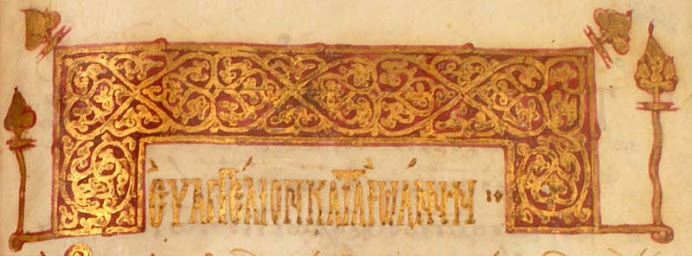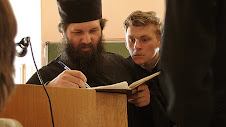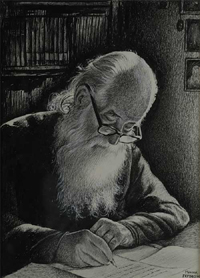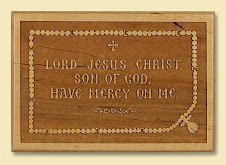
In our consideration of why St Symeon is called the “New Theologian” we will take as our starting point Archbishop Basil’s suggestion that this sobriquet “was perhaps first given to him by his opponents. The term had a nuance that sounded pejorative to conservative Byzantine ears but it was quickly appropriated by Symeon’s disciples with enthusiasm.” [1] This will help us approach the question dialogically, by considering a key point of St Symeon’s teaching both from the side of those who view him as fully in the line of traditional Orthodox spirituality as well as from the side of those who argue that he represents something genuinely novel. For evidence of the former view we will draw upon the works of Archbishop Basil (Krivicheine), [2] Bishop [now Metropolitan] Hilarion (Alfeyev) [3] and Hieromonk Alexander (Golitzin), [4] while drawing upon three essays by Fr John Anthony McGuckin for the latter view. [5]
Very much at issue here is how the word “new” is read. St Symeon’s title is most often explained as putting him in a direct line with the Evangelist John and St Gregory Nazianzus, who are the only two other Fathers who have popularly been given the title of “theologian.” Seen in this way, St Symeon is “new” only in the temporal sense that he has “renewed” mystical theology in his own life and doctrine. The title here is used not to connote novelty, but quite the opposite: it implies the renewal of traditional theology and spiritual practice. I would label the use of this term as a “fideist” approach, by which every saint is looked upon as a “rule of faith” wholly within the pattern of Orthodox tradition: his fidelity to Tradition is emphasized above all, while any eccentricity or discrepancy within Tradition is downplayed.
Bishop Hilarion, for instance, states in the General Conclusion of his work that his “major concern in the preceding chapters was to show the fundamental unity between Symeon the New Theologian and Orthodox tradition, namely Holy Scripture and the teaching of the apostles and church Fathers. [6] Hieromonk Alexander similarly argues that St Symeon’s writings on deification and spiritual fatherhood offer nothing other than “a uniquely personal witness to long-established elements in the Greek patristic tradition.” [7] Finally, as Archbishop Basil asserts, “The term ‘theologian’ is to be understood here, as with most of the Greek Fathers, not in the sense of a theologian working out new dogmas, but as one who has reached the heights of contemplation. The adjective ‘New’ would mean a renewer of the apostolic life which had been in large part forgotten, as Symeon himself states.”[8]
Compare this, however, with the critical, historicist reading given by Fr John Anthony McGuckin, who sees St Symeon as “one of the least representative mystics of the eastern Christian tradition.” [9] McGuckin criticizes those who are “continually putting the context for a study of an eleventh-century Byzantine author, anywhere (it seems) except the eleventh century. [10] Here St Symeon is “new” in a very different way from above: he is seen as an innovator who emphasizes the primacy of the spiritual father and his visionary experiences largely to establish his own authority over suspicious monks. One can easily imagine how this alleged novelty would have raised suspicion among his contemporaries and would have lead to the attribution of “new theologian” in a pejorative or at least ironic sense.
An important methodological question arises as well: Are we, as Orthodox bound to accept, largely uncritically, the “fideist” portrayal of various saints as represented in hagiography and hymnography, if not as literal than at least as iconic portrayals? Or is there value in a more critical “deconstruction” of pious literature? Fr McGuckin, at least, asserts their compatibility, remarking: “I have noticed in several seminary discussions of this point how often some interpret the historical contextualization of visionary experience as an attempt to reduce it to those factors which preceded or evoked it. Such reductionism is not my concern, nor is it a corollary of the argument except in the crudest misunderstanding of the logic of discourse.
[1] In the Light of Christ (Crestwood, NY: St Vladimir’s Seminary Press, 1986), 62.
[2] Ibid.
[3] St Symeon the New Theologian and Orthodox Tradition (Oxford: Oxford University Press, 2000).
[4] On the Mystical Life: The Ethical Discourses, Vol. 3: Life, Times and Theology (Crestwood, NY: St Vladimir’s Seminary Press, 1997).
[5] “Symeon the New Theologian (d. 1022) and Byzantine Monasticism,” in A. Bryer and M. Cunningham Mount Athos and Byzantine Monasticism (London: Variorum, 1996); “St. Symeon the New Theologian (969-1022): Byzantine Spiritual Renewal in Search of a Precedent” in R. N. Swanson, The Church Retrospective (Ecclesiastical History Society, 1997); “The Luminous Vision in Eleventh-Century Byzantium: Interpreting the Biblical and Theological Paradigms of St. Symeon the New Theologian” in M. Mullet and A. Kirby, Work and Worship at the Theotokos Evergetis 1050-1200, (Belfast: Byzantine Texts and Translations, 27, 1997).
[6] Alfeyev, 271
[7] Golitizin, 11.
[8] Krivocheine, 62-63, emphasis mine.
[9] McGuckin, “Luminous Vision,” 97, emphasis in the original.
[10] Ibid., 97, emphasis in the original.
Very much at issue here is how the word “new” is read. St Symeon’s title is most often explained as putting him in a direct line with the Evangelist John and St Gregory Nazianzus, who are the only two other Fathers who have popularly been given the title of “theologian.” Seen in this way, St Symeon is “new” only in the temporal sense that he has “renewed” mystical theology in his own life and doctrine. The title here is used not to connote novelty, but quite the opposite: it implies the renewal of traditional theology and spiritual practice. I would label the use of this term as a “fideist” approach, by which every saint is looked upon as a “rule of faith” wholly within the pattern of Orthodox tradition: his fidelity to Tradition is emphasized above all, while any eccentricity or discrepancy within Tradition is downplayed.
Bishop Hilarion, for instance, states in the General Conclusion of his work that his “major concern in the preceding chapters was to show the fundamental unity between Symeon the New Theologian and Orthodox tradition, namely Holy Scripture and the teaching of the apostles and church Fathers. [6] Hieromonk Alexander similarly argues that St Symeon’s writings on deification and spiritual fatherhood offer nothing other than “a uniquely personal witness to long-established elements in the Greek patristic tradition.” [7] Finally, as Archbishop Basil asserts, “The term ‘theologian’ is to be understood here, as with most of the Greek Fathers, not in the sense of a theologian working out new dogmas, but as one who has reached the heights of contemplation. The adjective ‘New’ would mean a renewer of the apostolic life which had been in large part forgotten, as Symeon himself states.”[8]
Compare this, however, with the critical, historicist reading given by Fr John Anthony McGuckin, who sees St Symeon as “one of the least representative mystics of the eastern Christian tradition.” [9] McGuckin criticizes those who are “continually putting the context for a study of an eleventh-century Byzantine author, anywhere (it seems) except the eleventh century. [10] Here St Symeon is “new” in a very different way from above: he is seen as an innovator who emphasizes the primacy of the spiritual father and his visionary experiences largely to establish his own authority over suspicious monks. One can easily imagine how this alleged novelty would have raised suspicion among his contemporaries and would have lead to the attribution of “new theologian” in a pejorative or at least ironic sense.
An important methodological question arises as well: Are we, as Orthodox bound to accept, largely uncritically, the “fideist” portrayal of various saints as represented in hagiography and hymnography, if not as literal than at least as iconic portrayals? Or is there value in a more critical “deconstruction” of pious literature? Fr McGuckin, at least, asserts their compatibility, remarking: “I have noticed in several seminary discussions of this point how often some interpret the historical contextualization of visionary experience as an attempt to reduce it to those factors which preceded or evoked it. Such reductionism is not my concern, nor is it a corollary of the argument except in the crudest misunderstanding of the logic of discourse.
[1] In the Light of Christ (Crestwood, NY: St Vladimir’s Seminary Press, 1986), 62.
[2] Ibid.
[3] St Symeon the New Theologian and Orthodox Tradition (Oxford: Oxford University Press, 2000).
[4] On the Mystical Life: The Ethical Discourses, Vol. 3: Life, Times and Theology (Crestwood, NY: St Vladimir’s Seminary Press, 1997).
[5] “Symeon the New Theologian (d. 1022) and Byzantine Monasticism,” in A. Bryer and M. Cunningham Mount Athos and Byzantine Monasticism (London: Variorum, 1996); “St. Symeon the New Theologian (969-1022): Byzantine Spiritual Renewal in Search of a Precedent” in R. N. Swanson, The Church Retrospective (Ecclesiastical History Society, 1997); “The Luminous Vision in Eleventh-Century Byzantium: Interpreting the Biblical and Theological Paradigms of St. Symeon the New Theologian” in M. Mullet and A. Kirby, Work and Worship at the Theotokos Evergetis 1050-1200, (Belfast: Byzantine Texts and Translations, 27, 1997).
[6] Alfeyev, 271
[7] Golitizin, 11.
[8] Krivocheine, 62-63, emphasis mine.
[9] McGuckin, “Luminous Vision,” 97, emphasis in the original.
[10] Ibid., 97, emphasis in the original.









4 comments:
I read St Symeon as an example of the Tradition not at all meant for his time and circumstances alone. He shows us the path to follow and the life in Christ we should strive for. In Hymn 27 as quoted by Archbishop Basil, St Symeon says, "Do not say that it is impossible to receive the Spirit of God...Do not say that men cannot perceive the divine light, or that it is impossible in this age! Never is it found to be impossible, my friends. On the contrary, it is entirely possible when one desires it." It seems to me that St Symeon himself believed that his way of life in God was available to all.
Am I naive or fundamentalist in believing that the science of the fathers is just that, a science which, when put into practice, it produces the expected outcome of turning the one living the Tradition into a saint? Of course God is always free. He can not be forced. But the amazing thing is that there are countless saints throughout the ages that testify that God is a good Father who will give the Holy Spirit to those who ask. Is St Symeon really that different from St Gregory Palamas or right into our own age St Seraphim of Sarov, St John of Kronstadt, St Theophan the Recluse, Elder Paisios of Athos and Elder Porphyrios? It does not seem so to me. But then again, I do not hold a degree in Orthodox theology :-( All I know is what moves my heart!
Again Archbishop Basil says that "if one does not obtain such conscious vision already here below, it is one's fault." Archbishop Basil quotes Ethical Discourse 10, "he should know that whoever he is, he deprives himself of such blessings to the degree that he is negligent and does not observe the commandments." And in the Practical and Theological Chapters 1 St Symeon says that "For every man judges others by his own condition, by what he is himself-in virtue and in vice." I choose to believe St Symeon and hope for the unthinkable, to see my Lord Jesus Christ someday....Isn't it that, what we long for when we come forward to receive His blood and Body in the Eucharist?..Oh if I could only touch the hem of His garment one day...I will be healed! Lord Jesus Christ have mercy on me.
The problem of hagiography is one which has interested me for some time, though I have never found a good treatment of it in any scholarly literature. (This surprises me a bit since I would have thought that at least Western/Catholic hagiography would have been submitted to a “general theory” or “interpretive paradigm” which seeks to “explain” it.) I had once thought that some of the writings of Eric Voegelin could help illumine the issue a bit, but after taking a year off from Voegelin’s works, I find that I am terribly out of practice wielding his concepts. Even so, I tend to approach hagiography from the perspective that it creates an official public memory of an individual by the Church for the instruction and edification of its membership. It reflects the Church’s “experience” of the Saint or, at least, the experience of those aspects of the Saint’s life which recapitulate the Gospel. As vague as this understanding admittedly is, I hold to it because it maintains a clear line of demarcation between the intents and purposes of hagiography and the intents and purposes of historiography.
One only need to read A Prodigal Saint and compare it with the standard (though occasionally incongruent) hagiographic texts produced to restate the life of St. John of Kronstadt. In fact, the hagiographic tradition surrounding St. John makes for fascinating study due to how much of his memory was bound up with socio-political questions in (and outside of) Russia during the 20th C. This is also true of the Royal Martyrs, with some traditions emphasizing their place as the head of a “Christian Empire” and a continuation of the sacred political form established by St. Constantine and others simply focusing on the fact that they were murdered by atheists and endured their suffering with meekness and humility. The hagiographic traditions of these Saints, despite their recent vintage, indicate tensions in the official public memory. At the same time, it also demonstrates ways in which a Saint’s life—which is no less variegated, rich, and eventful than any other person’s—can have certain facets refocused or reemphasized for changing social, cultural, political, or even ecclesiastical situations. (Perhaps the most famous case of this in Christian history—which cuts across the East/West divide—is the deployment of St. George and his post-martyric miracles.)
Now, just to be clear, I am not attempting to find a sly way to deny that a given Saint actually lived or to call their hagiographic account into question. What I am grasping at (and will continue to grasp at) is a method for reading and internalizing any Saint’s life without necessarily falling into fideism.
Gabriel:
You wrote, "I tend to approach hagiography from the perspective that it creates an official public memory of an individual by the Church for the instruction and edification of its membership. It reflects the Church’s “experience” of the Saint or, at least, the experience of those aspects of the Saint’s life which recapitulate the Gospel"
I agree. History and hagiography are two different things. But if I attempt to separate fact from fiction in the life of any saint by using the tools of higher criticism, for example, I walk a perilous path. We can not 'watch the grass grown in the 10th century' from our 21st. Besides in as much as the life of any saint conforms to that well trodden path of holy tradition in its general direction and way of life..I have no reason to doubt it. If a scholar researches the life of a saint in a historically strict and critical way, fine. That will not add or take from my purpose as a faithful layman, in looking at that life, as it has been preserved by holy tradition and try to 'imitate it'. I do not think that we should be trying to reduce any life of a saint to a 'method' that we can internalize. The method has already been spelled out by our ascetics saints, our monastic elders and by the Church Fathers. Orthodox Dogma establishes our boundary that protects us from heresy and guides us in the right direction, as Fr John Romanides explains. Once we have this dogmatic consciousness, then I have to come to terms with the fact that I can not 'think' my way out of the passions, I have to PRAY my way out of them. I do not memorize facts, events and ideas. True knowledge comes from learning virtue and forsaking sin.I do not have to have St Symeon's exact prayer rule but I MUST pray. I do not do it alone, I need a spiritual father, I need the sacraments etc.
If I read that St Seraphim prayed on a rock for a thousand days and nights...I can not think that I must go out there and try to do the same. This is absurd! But I must realize that I must be steadfast in my pursuit of holiness.
I love homily 19 of St Macarius where I read ,
"It is however necessary at first for one coming to the Lord to force himself thus to do good and even if he should not in his heart be so inclined, he must constantly await His mercy with unshaken faith and push himself to love, even if he does not have love. He ought to push himself to meekness, even if he has non,...And so God, seeing him striving so......gives him true charity, true meekness...etc.
This is the story of how St. Symeon the New Theologian met his spiritual father, St Symeon Eulabes (The Pious). "This story illustrates the close bond uniting the master and the disciple, and how such love overcomes all fear. It also shows that before choosing and following a spiritual father one must first believe in him;
It was he (St Symeon the Pious), who invited Symeon to follow him. 'Come, my child I will lead you to God'. When Symeon hesitated, his spiritual father told him: 'Light a great fire, that I may pass into the center: do not follow me if I do not remain untouched! 'These words confused me', Simeon wrote, 'and I did what he had commanded. And the flame burned and he stood in its center, intact, unconsumed, and he called me to him. I said I'm afraid master, I am a sinner! He advanced, came to me and embraced me saying , Why were you afraid? Why this fear and trembling? This is a great and frightening wonder: you will see even greater things!'
Finally to subdue Symeon's fear, his spiritual master made him approach: 'He enfolded me with his arms, and he kissed me again with a holy kiss, and he yielded a fragrance of immortality. I believed, I chose to follow him, and I desired to become his slave, his alone." Archbishop Basil Krivocheine, In The Light of Christ, p.98-99, SVS Press 1986.
Then St Symeon the Pious gave the Theologian the book of St. Mark (St Mark the Ascetic) We know St Symeon practiced St Mark's counsel quite literally 'listening to the admonitions of his conscience' . He also read Diadochus of Photice. St Mark and Diadochus provided the method. St Symeon the Pious was the living example and even after his death, the Theologian never forgot his teacher.
Should I go ask my father confessor to stand in the fire??...I don't think so. But I know he is an Orthodox Christian full of grace, wisdom and love.
Post a Comment